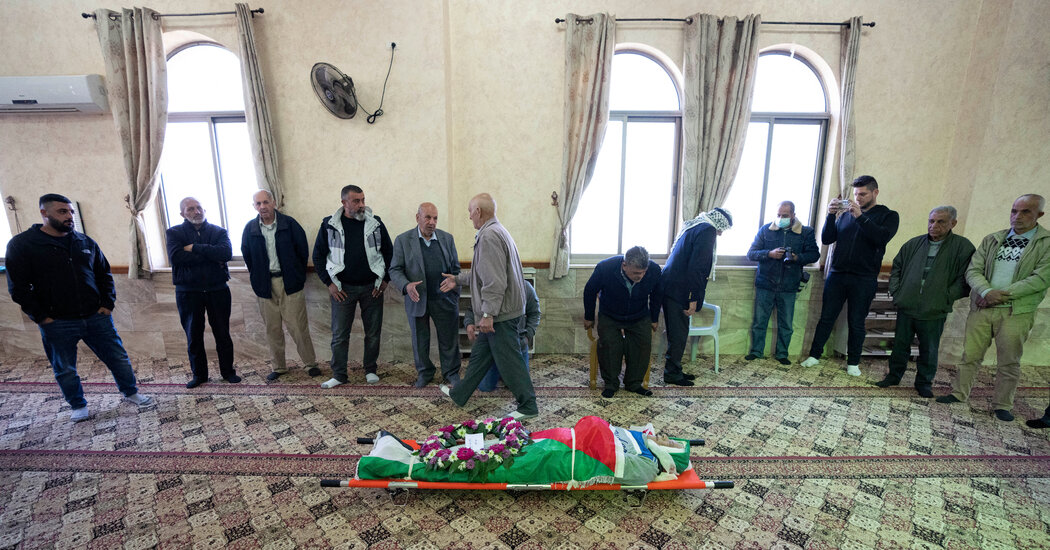The coroner’s report suggested that Omar Assad, 78, had a stress-induced heart attack as a result of injuries he sustained while in Israeli military custody.
JERUSALEM — A 78-year-old Palestinian American man died this month from a stress-induced heart attack brought on by injuries sustained while he was detained by Israeli soldiers, according to an autopsy report, obtained by The New York Times on Wednesday.
The death has brought renewed scrutiny on Israel from its closest allies in Washington, who have asked for a “clarification” and thorough investigation into the circumstances surrounding the death of the man, Omar Abdelmajed Assad.
Mr. Assad had pre-existing heart ailments and was detained by dozens of Israeli soldiers for about an hour on Jan. 12 in his village of Jiljilya in the occupied West Bank. He was blindfolded with his hands bound behind his back and lying on the ground, according to witnesses, conditions that his doctor said contributed to his death. One witness and his doctor said he died while in Israeli custody. He was found face down and unresponsive with his blindfold still on.
Mr. Assad’s life and death mirrored the daily perils faced by Palestinians living under Israeli occupation in the West Bank. The Israeli military routinely conducts night raids on Palestinian villages aimed at thwarting attacks, and residents can be stopped for checks on the road or arrested at home.
The autopsy was conducted by the coroner for the Palestinian Authority, which administers parts of the West Bank. Mr. Assad had bruises on his head as a result of traumatic brain injuries, it found, without saying what may have caused those injuries. And there was internal bleeding in his eyelids from being blindfolded tightly as well as other bruises on his arms and red welts on his wrists from zip ties.
The Palestinian Authority and the Israeli military are still investigating the death. Mr. Assad was a U.S. citizen with children, grandchildren and great-grandchildren living in the U.S., and his family and several members of Congress have demanded an American investigation. But the United States has not said whether it will investigate.
A preliminary conclusion from the Palestinian investigation determined that he had been “severely beaten,” according to one Palestinian official with knowledge of the investigation.
“The investigation indicated that he had been subjected to harsh treatment and violence,” according to an excerpt from the preliminary findings of the investigation obtained by The Times. “His body had many injuries documented and detailed in the autopsy.”
Initially, the Israeli military said Mr. Assad had been alive when he was released. But subsequently, the Israeli authorities declined to answer questions about what happened during his detention, what his condition was when the soldiers left and whether he was given any medical treatment, saying that was part of the investigation.
The Israeli rights group B’Tselem said Israel rarely prosecutes soldiers responsible for harming Palestinians.
The soldiers stopped Mr. Assad in what the Israeli military described as a “routine check” at about 3 a.m. as he was driving home after a night playing cards and drinking coffee with cousins. An Israeli military spokesman has said that he was detained after he resisted the check and refused to cooperate with questioning.
The doctor who tried to resuscitate Mr. Assad, Islam Abu Zaher, said his face was blue from lack of oxygen, adding he had most likely been deprived of oxygen for 15 to 20 minutes — which the doctor suggested could have caused his heart and lungs to fail.
One witness said that when the soldiers discovered his condition, they abandoned him instead of providing medical attention. Dr. Abu Zaher questioned why Mr. Assad appeared to have been thrown on the ground face down and why he was not given any first aid by the Israeli forces before they left.
Mmdouh Abdulrahman, one of the other four men detained by Israeli forces that night, said a soldier came to check on Mr. Assad. The soldiers whispered among themselves, then one of them cut one of the zip ties that had been on Mr. Assad’s wrists and they left quickly, Mr. Abdulrahman said.
As soon as the soldiers left the courtyard, Mr. Abdulrahman said he untied Mr. Assad’s blindfold and found no pulse on his friend.
Mr. Assad had open-heart surgery and several stents implanted about four years ago, according to Dr. Abu Zaher, who said he had been treating Mr. Assad for obstructive pulmonary disease in recent months. The lung disease could have made it difficult for him to breathe lying face down, Dr. Abu Zaher said.
Mr. Assad and his wife, Nazmieh Assad, moved to the U.S. in the 1970s and opened several grocery stories. They returned to Jiljilya more than a decade ago, but Israel had revoked their Palestinian ID cards while they were abroad.
Before he was detained, Mr. Assad was optimistic that he would soon be able to travel freely between his birthplace in the West Bank and his adopted home in the United States. He was eager to return to the U.S. to see his seven children, 17 grandchildren and three great-grandchildren, but feared that Israel would not allow them to return home without Palestinian ID cards. They had spent the past several years trying to have them reinstated.
In the weeks before his death, Mr. Assad expected his and his wife’s names would soon be on a list of approved reinstatement applications.
On Monday, nearly two weeks after Mr. Assad died, a new list of names was published. Their names were on it.
Rawan Sheikh Ahmad contributed reporting from Haifa, Israel.


























